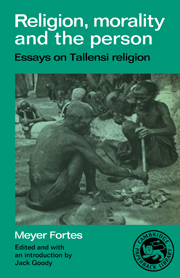Book contents
- Frontmatter
- Contents
- List of figures
- Introduction by Jack Goody
- 1 Divination: religious premisses and logical techniques
- 2 Prayer
- 3 Ritual festivals and the ancestors
- 4 Ancestor worship in Africa
- 5 Ritual and office
- 6 Totem and taboo
- 7 Coping with destiny
- 8 Custom and conscience
- 9 The first born
- 10 The concept of the person
- Endpiece: sacrifice among theologians and anthropologists
- Notes
- References
- Index
7 - Coping with destiny
Published online by Cambridge University Press: 13 October 2009
- Frontmatter
- Contents
- List of figures
- Introduction by Jack Goody
- 1 Divination: religious premisses and logical techniques
- 2 Prayer
- 3 Ritual festivals and the ancestors
- 4 Ancestor worship in Africa
- 5 Ritual and office
- 6 Totem and taboo
- 7 Coping with destiny
- 8 Custom and conscience
- 9 The first born
- 10 The concept of the person
- Endpiece: sacrifice among theologians and anthropologists
- Notes
- References
- Index
Summary
A belief in a principle usually glossed as Fate or Destiny, parallel in many particulars to analogous notions in the religions of classical antiquity and in such extant scriptural systems as Calvinistic Christianity, Islam, Buddhism and Hinduism, is a prominent feature of many West African religious systems. At the level of doctrine it postulates a supernatural or mystical determinacy in human affairs such that the whole course – or at least significant parts – of each individual's life is set, if not minutely pre-ordained, by pre-natal allocation, prescription or commitment. Whether it is beneficent or maleficent in the way it works out, at this level it is conceptualized as inescapable, irrevocable, and unknowable until it manifests itself. But there is another level, the level of practice, where dogma is translated into ritual action directed towards coping with the vicissitudes of daily life. And here we meet with a paradox, whether or not there are formulated doctrines or no more than the loosely phrased meta-physical or cosmological premisses that can be inferred from the practices of non-scriptural traditional religious systems.
Fate, which is in theory irresistible and irrevocable, is in practice taken to be controllable. This applies particularly, as one might expect, in the face of what presents as injurious or evil Destiny. And the prophylactic or defensive measures that may be resorted to areas customary and as sanctioned, as much part of the accepted complex of metaphysical and ritual beliefs and practices, as the notion of Fate itself.
- Type
- Chapter
- Information
- Religion, Morality and the PersonEssays on Tallensi Religion, pp. 145 - 174Publisher: Cambridge University PressPrint publication year: 1987



